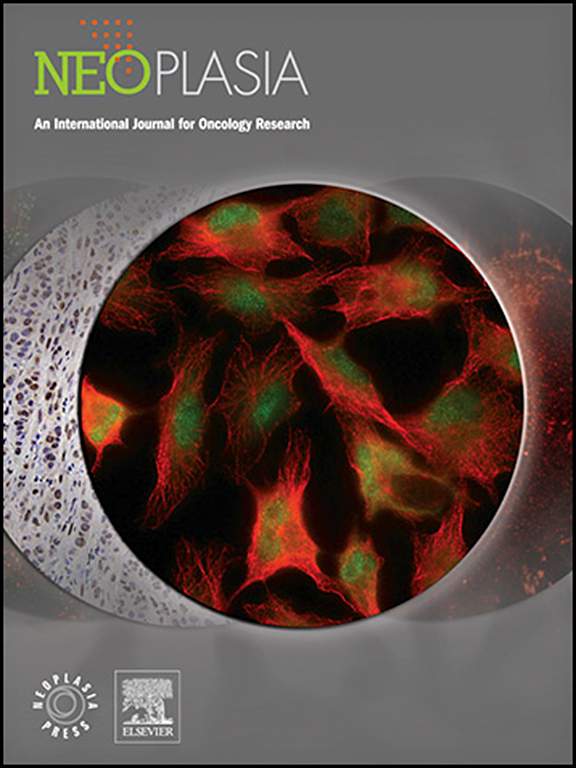消耗调节性 T 细胞可增强免疫原性弱的新抗原疫苗诱导的 T 细胞反应。
IF 7.7
2区 医学
Q1 Biochemistry, Genetics and Molecular Biology
引用次数: 0
摘要
背景:新抗原疫苗因其肿瘤特异性和绕过中枢耐受机制的能力,在治疗晚期癌症方面具有显著的潜力。然而,许多新抗原的免疫原性较差,肿瘤和肿瘤引流淋巴结中存在的免疫抑制因子也会影响癌症新抗原疫苗的疗效。消除免疫抑制细胞将改善疫苗诱导的抗肿瘤免疫细胞的启动和扩增:在这项研究中,Treg清除疗法(由CD25mAb和低剂量环磷酰胺(LD-CTX)组成)与新抗原疫苗联合用于治疗实体瘤小鼠。我们构建了两种类型的肿瘤模型,并在基因和蛋白质水平上研究了四组(PBS、疫苗、CD25mAb+CTX 和组合)的疗效差异。应用ELISPOT和TCR测序检测新抗原反应性T细胞(NRT)的扩增和肿瘤抗原的扩散:联合组的 ELISPOT 结果显示,弱免疫原性肽诱导的新抗原反应性 T 细胞明显扩增。联合组在抑制肿瘤生长、延长肿瘤小鼠存活时间和促进 T 细胞浸润肿瘤方面均有明显改善。此外,与Vac组相比,联合组通过TCR测序检测到了更多的新抗原靶向T细胞和TAA靶向T细胞。转录组测序和流式细胞术结果显示,联合组中Tregs的数量低于疫苗组,而记忆效应T细胞和效应T细胞的比例高于疫苗组。结论:我们的研究首先揭示了抑制Treg和T效应细胞对免疫系统的影响:我们的研究首次发现,抑制 Tregs 的正常功能可将 "较弱 "的新抗原转化为 "较强 "的新抗原,同时还有助于 NRT 细胞的增殖。这种抑制Treg的策略使免疫原性较差的新抗原引起了强有力的免疫反应,从而增强了新抗原疫苗在延缓肿瘤生长和延长宿主生存期方面的功效。本文章由计算机程序翻译,如有差异,请以英文原文为准。
Depletion of regulatory T cells enhances the T cell response induced by the neoantigen vaccine with weak immunogenicity
Background
The neoantigen vaccine has remarkable potential in treating advanced cancer due to its tumor specificity and ability to bypass central tolerance mechanisms. However, numerous neoantigens show poor immunogenicity, and the immune inhibitory factors of present in both tumors and tumor-draining lymph nodes impair the efficacy of cancer neoantigen vaccine. Eliminating immunosuppressive cells will improve the priming and expansion of anti-tumor immune cells induced by the vaccine.
Methods
In this study, a Treg-depleting regimen (consisting of CD25mAb and low-dose cyclophosphamide (LD-CTX)) was used in conjunction with a neoantigen vaccine for treating mice with solid tumors. We constructed two types of tumor models and investigated differences in therapy efficacy in the four groups (PBS, vaccine, CD25mAb+CTX and combination) at the genetic and protein levels. ELISPOT and TCR sequencing were applied to detect the expansion of neoantigen reactive T cells (NRT) and tumor antigen spreading.
Results
In the combinational group, the ELISPOT results showed an obvious expansion of NRT cells induced by weak immunogenic peptides. The combinational group exhibited significant improvement in inhibiting the tumor growth extended the survival time of tumor-bearing mice, and promoted T cells infiltration into tumors. Besides, compared to the Vac group, more neoantigen-targeted and TAA-targeted T cells were detected in the combinational group by TCR sequencing. The results of transcriptomic sequencing and flow cytometry showed that the number of Tregs in the combinational group was lower, while the proportions of memory effector T cells and effector T cells were higher than those in the vaccine group. An increase in mature DCs was also observed in vaccinated mice after receiving this Treg-depleting strategy.
Conclusion
Our research first revealed that inhibiting the normal function of Tregs transformed “weaker” neoantigens into “stronger” ones, while also contributing to the proliferation of NRT cells. This Treg-depleting strategy allowed neoantigens with poor immunogenicity to elicit a robust immune response, thereby augmenting the efficacy of the neoantigen vaccine in delaying tumor growth and prolonging the survival of the hosts.
求助全文
通过发布文献求助,成功后即可免费获取论文全文。
去求助
来源期刊

Neoplasia
医学-肿瘤学
CiteScore
9.20
自引率
2.10%
发文量
82
审稿时长
26 days
期刊介绍:
Neoplasia publishes the results of novel investigations in all areas of oncology research. The title Neoplasia was chosen to convey the journal’s breadth, which encompasses the traditional disciplines of cancer research as well as emerging fields and interdisciplinary investigations. Neoplasia is interested in studies describing new molecular and genetic findings relating to the neoplastic phenotype and in laboratory and clinical studies demonstrating creative applications of advances in the basic sciences to risk assessment, prognostic indications, detection, diagnosis, and treatment. In addition to regular Research Reports, Neoplasia also publishes Reviews and Meeting Reports. Neoplasia is committed to ensuring a thorough, fair, and rapid review and publication schedule to further its mission of serving both the scientific and clinical communities by disseminating important data and ideas in cancer research.
 求助内容:
求助内容: 应助结果提醒方式:
应助结果提醒方式:


